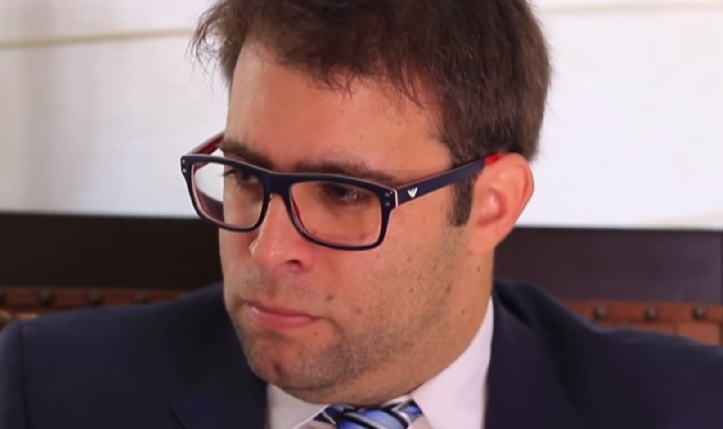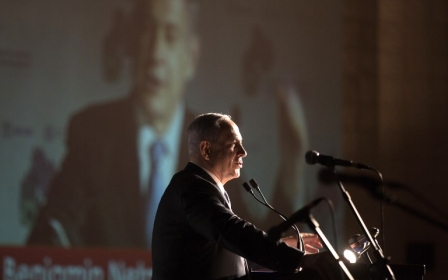ANALYSIS: Bad roll of the dice for Israel's casino-running MK?

Consider the following scenario. A young, ambitious international businessman, a patriot, the son of a politician, wants to come back home. Not just come home, but come home into the limelight, as a parliamentarian with the party his father once stood for.
So far so good - but if the entrepreneur’s latest business success was running a casino, and his father’s most memorable moment in politics was conviction for voter fraud, followed by another for the obstruction of justice, even the most ambitious man might pause for thought.
Not so for Oren Hazan, who rose from complete obscurity on the eve of the March 2015 general elections to the deputy speakership of the Knesset, picking up seats on the Israeli parliament’s most prestigious committees along the way.
Hazan is also the unlikely screw on which Netanyahu’s hair’s-breadth majority of one member of the Knesset (MK) turns - admittedly, any one MK acts as that screw, but few so far have exploited the position as ruthlessly as Hazan. And as of Monday, Hazan’s career could be extinguished as abruptly as it began, after Israel’s flagship news programme aired an expose claiming that Hazan's running of a casino - in itself illegal in Israel - was only half the story, and the less sordid half at that.
To go back to the beginning, however: a lesser (or a wiser) man than Hazan, when forced to measure political ambition against such personal circumstances, would, conceivably, decide not to run in the party primaries. If he decided to run anyway, he could choose to call in on a few favours but keep a low profile, hoping his father’s transgression and his own less than savoury business interests never arose; or, conversely, to confront the problem head-on, he could cast himself as the enemy of corruption, gambling and fraud - a gambler who has seen the light.
Hazan decided to combine the worst of both worlds, first denying he ever ran a casino, and then releasing a primaries campaign video with himself and his father doing a skin-crawlingly bad imitation of the Godfather.
![]() “My dear son, Oren,” groans Yechiel Hazan with a faint Italian accent à la Brando.
“My dear son, Oren,” groans Yechiel Hazan with a faint Italian accent à la Brando.
“This is your opportunity to return dignity to the state and amend the wrong done to me as a Knesset member … Sonny [sic], I trust you to do the job.”
“Papa”, Oren Hazan replies, “I’m giving the people of Israel an offer they can’t refuse.”
As part of his pivot to politics, Hazan gained extra notoriety by calling the Israeli veterans organisation Breaking the Silence during last summer’s Gaza war and offering them a transparently false and macabre story of killing Palestinian civilians as a reserve soldier.
There was no shortage of such killings during the war, but Hazan made his story so improbably grotesque that the organisation decided to engage with him. They only discovered his identity because he used his middle name for his pseudonym, Asaf Hazan.
If this sounds like it was too horrible to actually work, it was. Hazan landed in 30th place on the Likud’s slate for the Knesset at a time when the party was polling steadily at 24. He only just made it to the Knesset after Netanyahu cannibalised his right-wing allies, growing to 30 seats at the expense of Naftali Bennett’s Bayit Yehudi party; the vote was so close that Oren happily told an Israeli news site as votes were being counted that he placed bets for and against himself getting elected “so that I win either way”.
Hazan’s second winning streak came two months later, when longtime Netanyahu ally Avigdor Lieberman declared he was heading into opposition. This left Netanyahu with a paltry 61 MKs out of 120 - still giving him a majority but sharply upping the stakes for everyone involved. The resulting coalition had many an awkward aspect to its structure: the foreign ministry was all but dismembered between a deputy-without-a-minister and a minister-in-charge-of-negotiations, while the Communications Ministry was absorbed into the prime minister’s office in a move that many fear heralds significant challenges to free press.
But there was no more rapid an advancement than Hazan’s, who, according to several Israeli news sites, casually let it be known that unless he shares with Tzipi Hotoveli the position of deputy foreign minister - in effect, acting foreign minister - he might neglect to turn up to important votes.
While this particular position was denied to him, the compensation was abundant: the junior MK became deputy speaker of the parliament and was given seats on five committees: the Comptroller Committee, the Reform Committee, the House Committee, and the two most prestigious and powerful committees of the house, Security and Foreign Affairs, and Finance.
After several outlets reported - in an impressed, rather than outraged tone - on the young MK’s propensity for strong-arming the prime minister, Hazan released his own statement. In his version, discussions with Netanyahu were cordial and collegial, and he got the plush appointments only because the coalition needed “someone young and hardworking” to shoulder the administrative load. Either way, the precariousness of Netanyahu’s coalition was never as clear or as absurd.
Oren also marked his inauguration by accusing Hotoveli - a stalwart of the settler wing in the Likud - of pandering to the radical left by advising Arab MKs to move to Ramallah and by tabling his first bill, a proposal to make the study of Arabic compulsory even in majority Jewish schools from first grade on.
In the preamble to the bill, Hazan emphasised the status of Arabic as an official language in Israel, and observed that just as it is inconceivable for a Palestinian in Israel to graduate without speaking Hebrew, so should it be impossible for a Jew in Israel to graduate without knowing Arabic. Several coalition as well as opposition MKs affixed their signatures to the bill.
As of Monday, Hazan’s swift and contradictory career appears to have finally hit a snag. Channel 2 News, Israel’s flagship news programme, paid a visit to the establishment Hazan ran until last summer on Bulgaria’s Black Sea coast. According to the report, which featured clients as well as current and former employees, Hazan not only ran a casino at the resort, but also procured call girls for his clients, and was seen by them using hard drugs, including crystal meth.
After a pretty easy run with most of the Israeli media, Hazan now finds himself confronted with negative publicity of the worst kind. Hours after the broadcast, Hazan took to Facebook to deny Channel 2's report, announce that he is ready to take a lie detector test and also plans to sue the TV station.
Beyond ethical, moral and reputational considerations, the political implications are serious. Procurement of prostitution is illegal both in Bulgaria and in Israel. The same goes, quite obviously, for consumption of crystal meth. Even if Hazan gets to keep his job, Netanyahu now has every reason to boot him out of the Defence and Foreign Affairs Committee: the possibilities for blackmail of an alleged crystal meth addict with access to the most sensitive intelligence material are staggering.
Similar questions can be asked about his suitability for the Finance Committee, and as the role of a Deputy Speaker is a representative one, several opposition MKs are already vocally resenting being represented by a pimp.
The Likud - except one anonymous official who described the allegations, if true, as unprecedentedly embarrassing - is keeping mum. Netanyahu is yet to speak out. Hazan himself, in the meantime, has described the report as “lurid”, blaming the “sick imagination” of the reporters and swearing none of the above bears any relation to the truth. But whether it’s going up or down, it seems his career in the public eye has only just begun.
Middle East Eye propose une couverture et une analyse indépendantes et incomparables du Moyen-Orient, de l’Afrique du Nord et d’autres régions du monde. Pour en savoir plus sur la reprise de ce contenu et les frais qui s’appliquent, veuillez remplir ce formulaire [en anglais]. Pour en savoir plus sur MEE, cliquez ici [en anglais].




